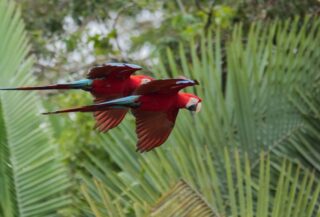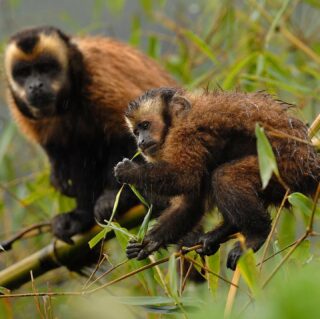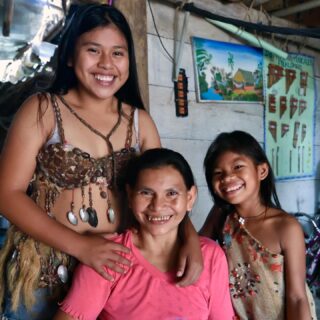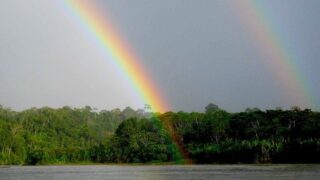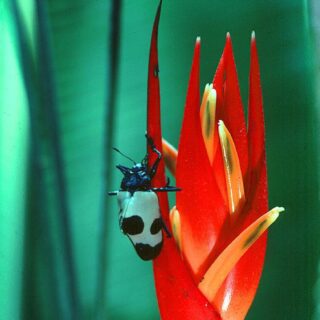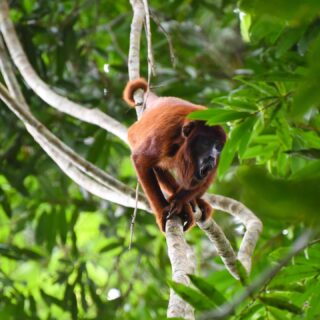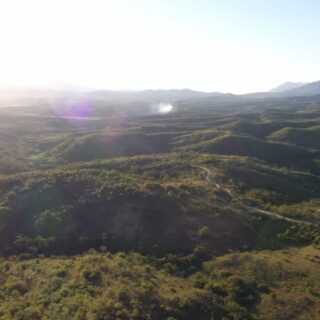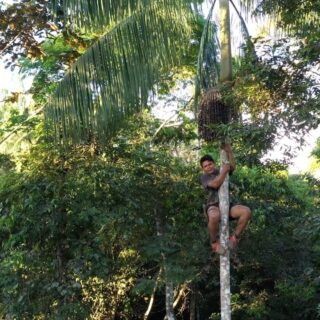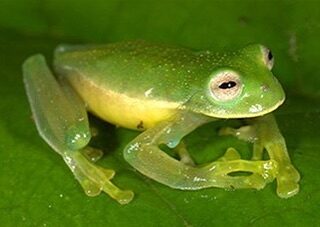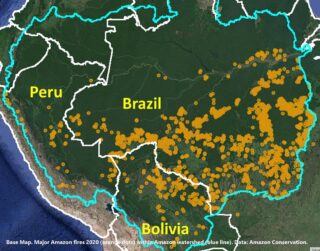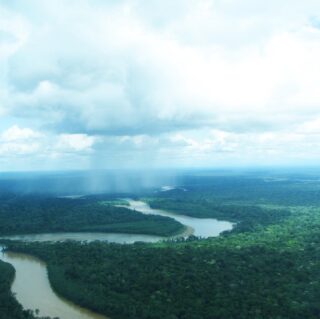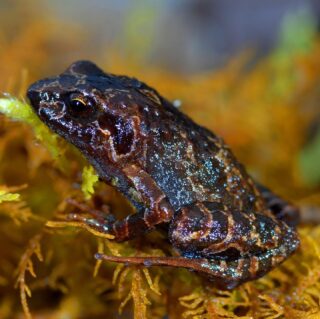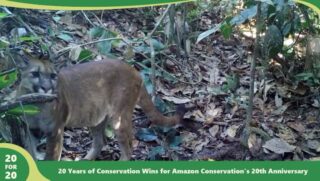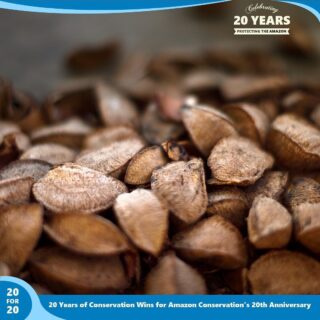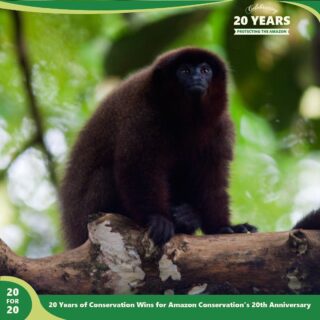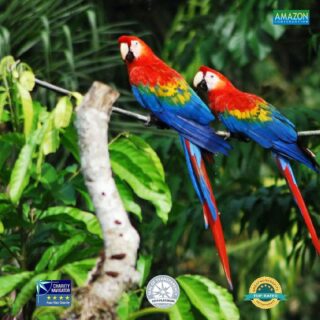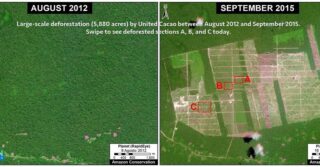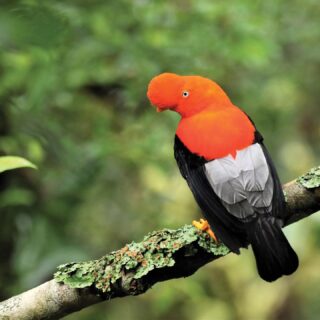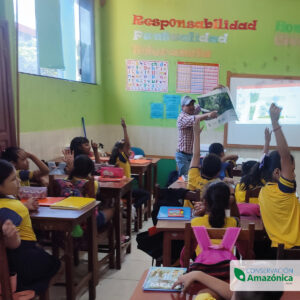 Our Bolivian sister organization Conservación Amazónica – ACEAA recently organized an environmental education training workshop with the Cobija Municipal Environmental Brigade and the Cobija Water and Sanitation Company (EPSAS) to educate young 4th and 5th-grade students about the importance of caring for their water systems that stem from Arroyo Bahía: the main water source for Cobija and surrounding communities.
Our Bolivian sister organization Conservación Amazónica – ACEAA recently organized an environmental education training workshop with the Cobija Municipal Environmental Brigade and the Cobija Water and Sanitation Company (EPSAS) to educate young 4th and 5th-grade students about the importance of caring for their water systems that stem from Arroyo Bahía: the main water source for Cobija and surrounding communities.
This workshop was part of an ongoing project to help protect and manage water resources from the Arroyo Bahía Conservation Area (a conservation area we helped create in 2022 known as the Natural Area of Comprehensive Management of the Arroyo Bahía Basin – ANGICAB). Since the creation of ANGICAB in April of 2022, the Autonomous Municipal Government of Cobija, in alliance with Conservación Amazónica- ACEAA and funded by the World Wildlife Fund – Sweden, launched the project titled Protegiendo el Arroyo Bahía, Garantizamos Agua para Cobija (Protecting the Arroyo Bahía, We Guarantee Water for Cobija). Through this project that began in April 2023, they intend to continue helping the residents of Cobija apply measures and actions that promote the conservation of ANGICAB, take advantage of non-timber forest resources, and collect solid waste in the ANGICAB and its area of influence for subsequent recycling.
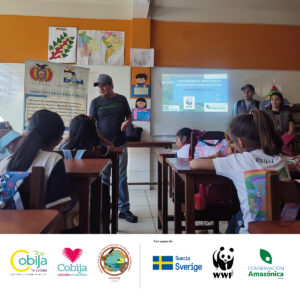 The workshop carried out by the Cobjija Municipal Environmental Brigade and EPSAS aimed at educating these young students to understand where their water comes from, the value of the ANGICAB protected area, and impactful changes they can implement in their daily routine to save water in their homes. The following topics were also covered during this workshop:
The workshop carried out by the Cobjija Municipal Environmental Brigade and EPSAS aimed at educating these young students to understand where their water comes from, the value of the ANGICAB protected area, and impactful changes they can implement in their daily routine to save water in their homes. The following topics were also covered during this workshop:
- Getting to know the ANGICAB Protected Area
- Economic importance of Amazonian species
- Managing forests, water resources and watersheds
- Reducing pollution in water sources
- Climate change, resilience and adaptation
Since Arroyo Bahía is the main water source for the entire city of Cobija, its protection and correct management of existing natural resources is very important to guarantee access to clean water for its residents. Teaching them the values of ANGICAB highlights the importance of conserving these bodies of water and the forests that surround them to ensure a healthy and natural ecosystem, along with the fauna and flora that inhabit them.
Multiple education trainings and workshops meetings have been held for teachers, educational students and young people from different groups since the beginning of this project, and has shown relative success in changing attitudes towards the integrity of ANGICAB. By raising awareness for this protected area, surrounding communities can help keep their water sources safe and protected for both the residents and wildlife that depend on them.

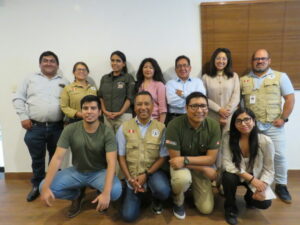
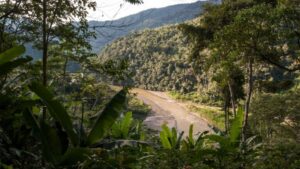
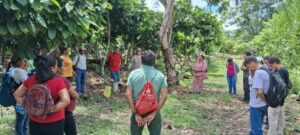 Our Peruvian sister organization
Our Peruvian sister organization 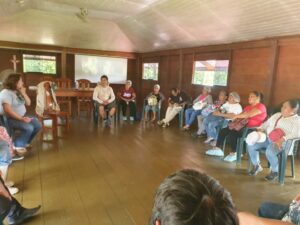 The Agroforestry Association of the Infierno Native Community has 21 hectares (about 52 acres) of agroforestry systems dedicated to the cultivation of cacao, in addition to having a processing plant with the capacity to process 19 thousand kilos (41,888 pounds) of cacao pulp per month. Partnering with the Agrobosque Cooperative would help provide them with technical support in the post-harvest processes, delivery of quality cacao, and the opportunity to obtain and maintain organic certification for crops associated with their agroforestry systems. Additionally, this exchange of experiences helped them open doors to jointly participate in various trade promotion activities and business conferences at the national level.
The Agroforestry Association of the Infierno Native Community has 21 hectares (about 52 acres) of agroforestry systems dedicated to the cultivation of cacao, in addition to having a processing plant with the capacity to process 19 thousand kilos (41,888 pounds) of cacao pulp per month. Partnering with the Agrobosque Cooperative would help provide them with technical support in the post-harvest processes, delivery of quality cacao, and the opportunity to obtain and maintain organic certification for crops associated with their agroforestry systems. Additionally, this exchange of experiences helped them open doors to jointly participate in various trade promotion activities and business conferences at the national level.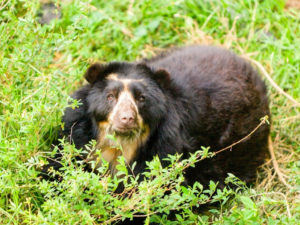
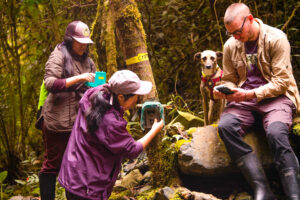 In addition to GPS tracking technologies, camera traps placed throughout the region capture images of the bears in their natural environment, providing vital information about their behavior and distribution. Through these monitoring efforts, our grounds team has recorded 43 medium to large-sized bears in more than 70,000 camera trap images throughout the studied area. As scientists continue their analysis of the Andean bear population, the exact total number of bears in the area is still unknown.
In addition to GPS tracking technologies, camera traps placed throughout the region capture images of the bears in their natural environment, providing vital information about their behavior and distribution. Through these monitoring efforts, our grounds team has recorded 43 medium to large-sized bears in more than 70,000 camera trap images throughout the studied area. As scientists continue their analysis of the Andean bear population, the exact total number of bears in the area is still unknown. 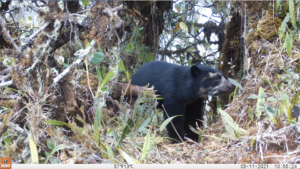 With the collection of this data, scientists can better understand these bears’ needs, habits, and impacts on the environment to fully understand their role in conservation, and allow organizations to prioritize the protection and restoration of their habitat accordingly. As an extension of this collaborative research, environmental education programs, and implementing sustainable conservation practices further prioritize this work to reduce human-bear conflicts and foster peaceful coexistence.
With the collection of this data, scientists can better understand these bears’ needs, habits, and impacts on the environment to fully understand their role in conservation, and allow organizations to prioritize the protection and restoration of their habitat accordingly. As an extension of this collaborative research, environmental education programs, and implementing sustainable conservation practices further prioritize this work to reduce human-bear conflicts and foster peaceful coexistence. 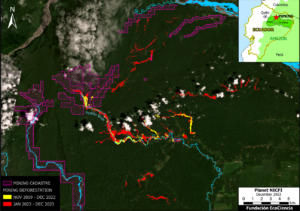 In a series of previous reports such as
In a series of previous reports such as 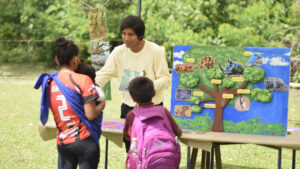 To help secure the longevity of the Amazon, part of our mission is to inspire the next generation of conservationists to take part in protecting the forests. The Amazon is home to not only an incredible array of flora and fauna but to local families and community members who also depend on its resources for their livelihood. Thus, the coexistence of people and nature is vital to keeping forests standing.
To help secure the longevity of the Amazon, part of our mission is to inspire the next generation of conservationists to take part in protecting the forests. The Amazon is home to not only an incredible array of flora and fauna but to local families and community members who also depend on its resources for their livelihood. Thus, the coexistence of people and nature is vital to keeping forests standing. 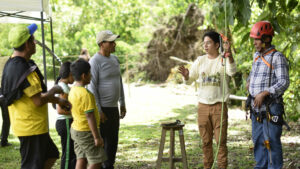 Visitors were given the opportunity to immerse themselves in the fascinating world of various animal groups by visiting detailed exhibitions on Amazonian mammals, insects, reptiles, and amphibians. Each of these exhibitions highlighted unique organism traits and key methods researchers use to study their presence in the region to better understand their impacts on the surrounding ecosystem. Additionally, the fair also offered a practical explanation of canopy climbing, a safe and sustainable method for climbing trees to help researchers study life in the treetops, an activity vital for scientific research and conservation. Visitors were amazed by the intricate details and functions of each organism and were able to explore the evolution and phylogenetic relationships between different groups of living beings, which allowed them to learn about the adaptations developed by various species to survive in their environment.
Visitors were given the opportunity to immerse themselves in the fascinating world of various animal groups by visiting detailed exhibitions on Amazonian mammals, insects, reptiles, and amphibians. Each of these exhibitions highlighted unique organism traits and key methods researchers use to study their presence in the region to better understand their impacts on the surrounding ecosystem. Additionally, the fair also offered a practical explanation of canopy climbing, a safe and sustainable method for climbing trees to help researchers study life in the treetops, an activity vital for scientific research and conservation. Visitors were amazed by the intricate details and functions of each organism and were able to explore the evolution and phylogenetic relationships between different groups of living beings, which allowed them to learn about the adaptations developed by various species to survive in their environment. 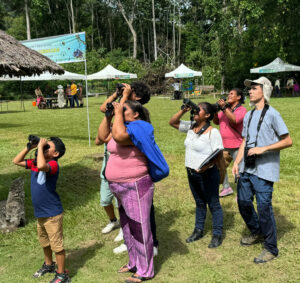 Educating others on the importance of interspecies relationships is essential for addressing crucial topics like climate change and its impact on the landscape and wildlife. Thanks to the coordination by the Manu Biological Station team, visitors were able to better understand the challenges faced by the Amazon and the importance of conserving this vital ecosystem for global balance.
Educating others on the importance of interspecies relationships is essential for addressing crucial topics like climate change and its impact on the landscape and wildlife. Thanks to the coordination by the Manu Biological Station team, visitors were able to better understand the challenges faced by the Amazon and the importance of conserving this vital ecosystem for global balance.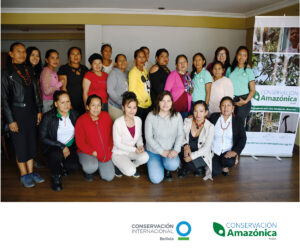
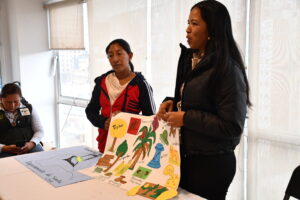 However, for women to have this leadership role, they need economic independence to support themselves and their families. For this reason, this event also had an entrepreneurship focus to strengthen their knowledge on how to establish a business and create a network to support the enrichment and experiences they share mutually. The chiquitano women from Palmarito de la Frontera Women’s Association Searching for New Horizons shared their experience with their venture with Amazonian Cusi oil, how they work among all the women, the different roles they have agreed upon, and the potential and growth that they had due to the support of organizations. The participants also received guidance from a specialist who trains and strengthens the skills of artisans and indigenous peoples by understanding cultural research, and product development, and creating a dynamic methodology adapted to their functionality.
However, for women to have this leadership role, they need economic independence to support themselves and their families. For this reason, this event also had an entrepreneurship focus to strengthen their knowledge on how to establish a business and create a network to support the enrichment and experiences they share mutually. The chiquitano women from Palmarito de la Frontera Women’s Association Searching for New Horizons shared their experience with their venture with Amazonian Cusi oil, how they work among all the women, the different roles they have agreed upon, and the potential and growth that they had due to the support of organizations. The participants also received guidance from a specialist who trains and strengthens the skills of artisans and indigenous peoples by understanding cultural research, and product development, and creating a dynamic methodology adapted to their functionality.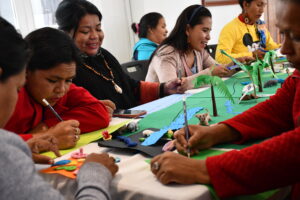 Aside from environmental threats, many of the women also reflected on their community norms that continue to make women’s rights invisible, as well as an analysis of the historical role of indigenous women participating in the fight for land, territory, natural resources, and for the self-determination of their people. While the women of Tacana II recognized that they had support from the men of their communities to exercise leadership as women, other participants shared that it continues to be a challenge to demonstrate the importance of women exercising these leadership roles and representing the voices of other women.
Aside from environmental threats, many of the women also reflected on their community norms that continue to make women’s rights invisible, as well as an analysis of the historical role of indigenous women participating in the fight for land, territory, natural resources, and for the self-determination of their people. While the women of Tacana II recognized that they had support from the men of their communities to exercise leadership as women, other participants shared that it continues to be a challenge to demonstrate the importance of women exercising these leadership roles and representing the voices of other women.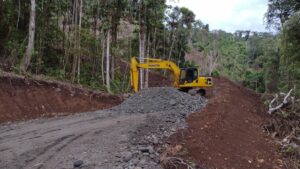
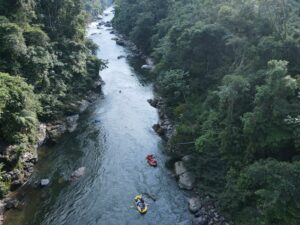
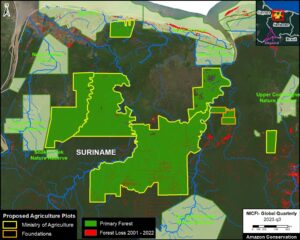 The environmental news platform
The environmental news platform